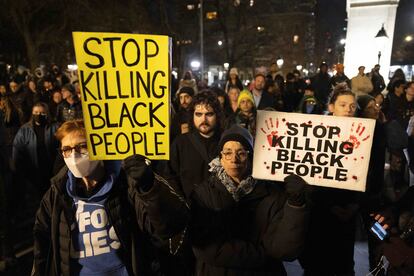The effect of police violence on Black Americans’ health is documented in two new studies
Police-involved killings of unarmed Black people totaled 331 from 2013 through 2019 in the database used by the researchers

The effect of police violence on Black Americans is tracked in two new studies, with one tying police-involved deaths to sleep disturbances and the other finding a racial gap in injuries involving police use of Tasers.
The health effects of police violence on Black people “need to be documented as a critical first step to reduce these harms,” three editors of JAMA Internal Medicine wrote in an editorial published Monday with the studies.
For the sleep study, researchers looked at responses from more than 2 million people from 2013 through 2019 in two large government surveys. They focused on people’s reports of sleep in the months following police-involved killings of unarmed Black people.
They found a pattern of sleep disturbances, particularly getting less than six hours of sleep, in Black people — but not among white people — in the six months following a police-involved killing.
For the years studied, police-involved killings of unarmed Black people totaled 331 in the database used by the researchers: Mapping Police Violence, a project using Justice Department statistics and crowdsourced databases. The killings included cases that gained national attention such as the deaths of Eric Garner and Tamir Rice, as well as others less widely known.
For more prominent police-involved deaths, there was a 11.4% increase in reporting very short sleep compared with the average for all Black survey respondents. For deaths, whether prominent or not, that happened in the same state as the survey respondent, the effect was a 6.5% increase.
This type of study cannot prove cause and effect. The researchers made adjustments for age, sex, education and other factors that might account for differences and still found the pattern of more sleep disturbance reports from Black people after police-involved deaths.
“Discrimination can manifest in all sorts of ways, one of which is unequal exposure to police use of force,” said Dr. Atheendar Venkataramani of the University of Pennsylvania, who led the study. Poor sleep can raise “the lifetime risk of a number of diseases, as well as the risk of early death.”
The second study found racial disparities in injuries that occurred when Tasers and similar weapons were used by police to incapacitate people.
It’s the first comprehensive national analysis of such injuries using emergency department data. The study was possible because of a new medical code, added in late 2019, denoting law enforcement-related use of Tasers and similar weapons.
Researchers analyzed data on 1,276 emergency department visits from October 2019 through December 2020 where an injury coincided with police use of such “conducted energy” devices.
Nearly 36% of those injured were Black, far above their 13.6% share of the general U.S. population. White people made up 39% of the injured, Hispanic people 17.6%, Native Americans 2% and Asian or Pacific Islander people 1.4%.
The injuries included puncture wounds, concussions, fractures and traumatic brain injuries. The devices are known to cause falls, but the researchers couldn’t pin down if police used the weapons incorrectly or the exact role of the weapons in the injuries.
“It’s really important to make sure that law enforcement officers get the proper training on how to deploy these things and minimize the risk of long-term injury,” said study co-author Kevin Griffith of Vanderbilt University.
Sign up for our weekly newsletter to get more English-language news coverage from EL PAÍS USA Edition
Tu suscripción se está usando en otro dispositivo
¿Quieres añadir otro usuario a tu suscripción?
Si continúas leyendo en este dispositivo, no se podrá leer en el otro.
FlechaTu suscripción se está usando en otro dispositivo y solo puedes acceder a EL PAÍS desde un dispositivo a la vez.
Si quieres compartir tu cuenta, cambia tu suscripción a la modalidad Premium, así podrás añadir otro usuario. Cada uno accederá con su propia cuenta de email, lo que os permitirá personalizar vuestra experiencia en EL PAÍS.
¿Tienes una suscripción de empresa? Accede aquí para contratar más cuentas.
En el caso de no saber quién está usando tu cuenta, te recomendamos cambiar tu contraseña aquí.
Si decides continuar compartiendo tu cuenta, este mensaje se mostrará en tu dispositivo y en el de la otra persona que está usando tu cuenta de forma indefinida, afectando a tu experiencia de lectura. Puedes consultar aquí los términos y condiciones de la suscripción digital.








































